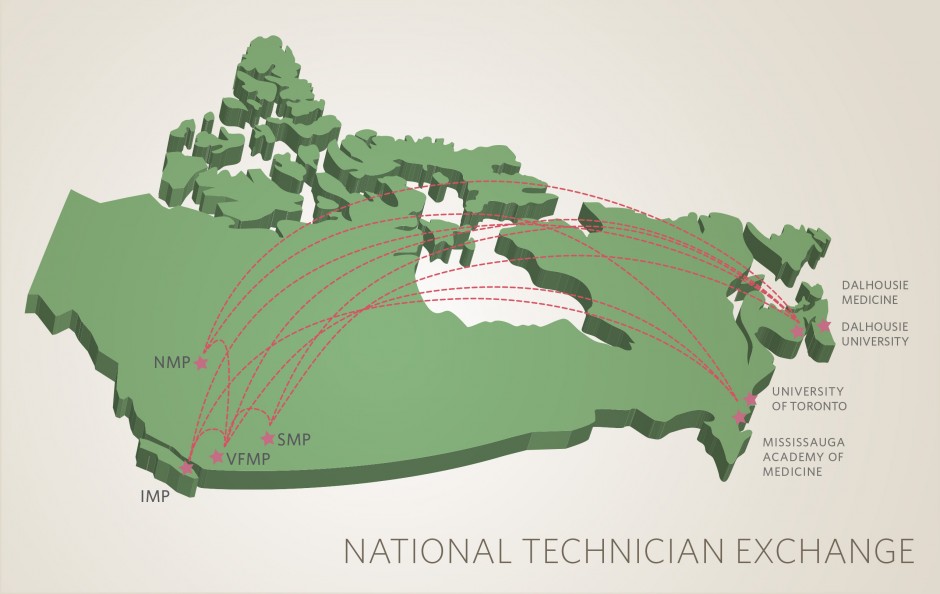Distributed medical programs are unique and complex. Their successful delivery requires not only the smooth integration of audiovisual and information technology, but an understanding of how this technology intersects with academic and clinical environments.
There are a select number of medical programs in Canada that rely heavily on a distributed model. Amongst the staff supporting them you will find professionals who have a deep understanding of the relationship between technology, distributed education, and the medical field. This year, professionals from three of these programs came together to share their technical expertise and develop partnerships that will directly benefit medical program delivery.
Cross-country exchange
In October 2013 technicians from medical programs at UBC, the University of Toronto, and Dalhousie University embarked on a cross-country exchange to share knowledge and foster relationships.
The exchange started with MedIT hosting the participants from Dalhousie University and the University of Toronto. In their week-long visits, they had the opportunity to observe the Faculty of Medicine’s Distributed Medical Program operations in four program sites: Vancouver, Victoria, Prince George and Kelowna.
In the weeks following, MedIT technicians travelled eastward to observe the programs of their peers. A technician from the Vancouver Fraser Medical Program visited the University of Toronto, where he had the opportunity to tour facilities and observe operations at campuses in Toronto and Mississauga. Another technician from the Southern Medical Program visited Dalhousie University, and Dalhousie Medicine New Brunswick (Dalhousie’s distributed site in Saint John).
Physically observing the different programs’ operating environments and having conversations with technical and program staff left the technicians charged with energy and ideas that they brought back to their respective programs.

Distributed medical program technicians travelled across the country to share their expertise and develop partnerships.
Drawing on shared knowledge
The momentum started by the exchange has been maintained through the National Technical Operations Working Group. Representatives from the three programs have been meeting (virtually) on a quarterly basis to share their challenges and solutions – discussing what has worked and what hasn’t in their unique environments.
The Working Group has allowed the Faculty of Medicine to make decisions on software and hardware purchases informed not only by industry literature, but application in a similarly distributed program. Additionally, how that software and hardware is used has been informed by the experiences of other programs. One example is MedIT’s WebEx implementation for the Department of Dermatology, where consultations with Dalhousie University proved extremely valuable.
The relationships established through the exchange have also allowed information to be shared in an ad hoc manner. When MedIT faced challenges with faulty equipment due to unforeseen maintenance needs this summer, technicians were quickly able to share what they learned with Dalhousie University and the University of Toronto. As both programs use similar equipment, the information provided enables them to prevent similar problems and expenses in the future. This kind of open communication will continue to benefit all three programs in terms of forecasting and avoiding future technology challenges.
By fostering these partnerships, MedIT is investing in informed technology decision making and planning methods that will improve the quality and efficiency of medical program delivery.
Related: